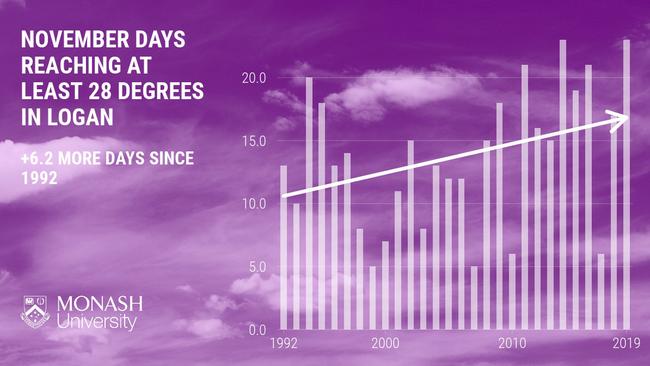Weather bureau latest: Logan is set for another weekend scorcher
Dr Christa Pudmenzky looks at November's rising temperatures. Plus, how can we help koalas stay safe during breeding season?

HyperLocal
Don't miss out on the headlines from HyperLocal. Followed categories will be added to My News.
The mercury will hover around 30 degrees for the rest of the week in Logan and should peak at 32 degrees on Sunday.
Across southeast Queensland, November temperatures are getting warmer over time.
In Logan, we typically see around 17 November days reach at least 28 degrees, which is six more than we saw in the 1990s.
This November average was smashed last year when 23 days hit or surpassed 28 degrees.
Voices from your community
Save the Koala chairwoman Deborah Tabart said she was still excited to see joeys in the wild, despite working with the fuzzy marsupials for more than 32 years.
"I still squeal at the sight of a baby koala," she said.
Deborah has been surveying populations on Stradbroke Island for more than ten years and urged everyone to drive carefully during breeding months.
"Breeding season is the most vulnerable time... When young males go looking for a mate, if they have to cross a road they risk getting run over."
Cars aren't the only threats to koalas. Several eucalyptus species, their main food source, are threatened by drought and extreme heat.
Community voices like Deborah's tell us how residents and business owners in Logan feel about their local climate. If you would like to contribute your voice to our column, you can fill out our 5-minute survey here.
Did you know?
Koalas enjoy drinking from water stations.
Researchers from the University of Sydney found that installing artificial water stations in the bush could help koalas survive extremely hot and dry periods.
This strategy would also support other tree dwelling species such as possums and gliders.
Dr Christa Pudmenzky is a climate scientist at the University of Southern Queensland.
This column is part of a collaboration between Monash University and News Corp to deliver hyperlocal weather and climate information.
Questions? You can email us at mcccrh@monash.edu


